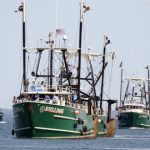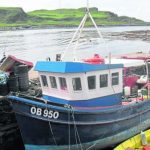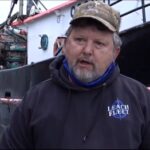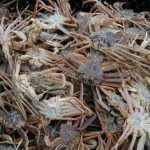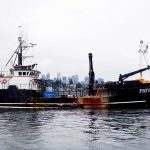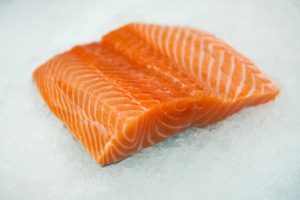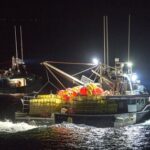Tag Archives: 1999 Marshall Decision
Is it 50 per cent of the fishery? What’s fair and what the feds won’t discuss on First Nations rights
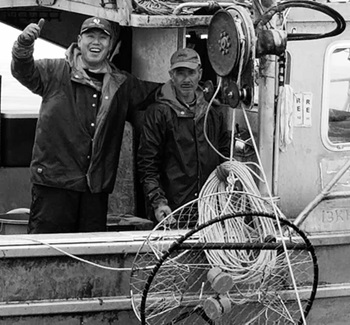 What’s fair? What’s a fair amount of Canada’s fisheries to transfer to First Nations to satisfy their moderate livelihood right? What’s fair to individual rights holders but, also, what’s fair to non-aboriginal communities whose cultures and incomes have relied upon fisheries for generations? Is it 50 per cent? That’s what Fisheries and Oceans Canada has gone with in two recent transfers of access to First Nations in Atlantic Canada and British Columbia that occurred without compensation to the commercial licence holders on the losing end. In 2021, Jason and the 33 other commercial fishermen in crab fishing area 24 were informed by DFO that the federal government was taking half the area’s 1,600 traps and giving them to the Five Nations. “It was definitely not fair,” said Voong, president of the BC Crab Fishermen’s Association, in a phone interview. more, >>CLICK TO READ<< 11:07
What’s fair? What’s a fair amount of Canada’s fisheries to transfer to First Nations to satisfy their moderate livelihood right? What’s fair to individual rights holders but, also, what’s fair to non-aboriginal communities whose cultures and incomes have relied upon fisheries for generations? Is it 50 per cent? That’s what Fisheries and Oceans Canada has gone with in two recent transfers of access to First Nations in Atlantic Canada and British Columbia that occurred without compensation to the commercial licence holders on the losing end. In 2021, Jason and the 33 other commercial fishermen in crab fishing area 24 were informed by DFO that the federal government was taking half the area’s 1,600 traps and giving them to the Five Nations. “It was definitely not fair,” said Voong, president of the BC Crab Fishermen’s Association, in a phone interview. more, >>CLICK TO READ<< 11:07
The Legal Fishery Sparking Arrests and Violence
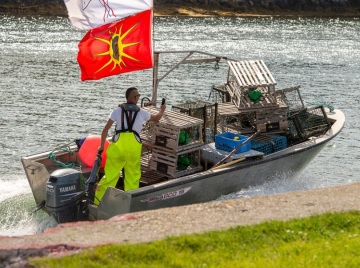 Atlantic Canada is home to the country’s most lucrative fisheries, including lobster—with an export value of CAN $3.2-billion in 2021—and young American eels, or elvers, which can sell for $5,000 per kilogram. But in 1999, the Supreme Court decision changed who could take a slice of this profitable pie. The court ruled in the case of Donald Marshall Jr. from Membertou First Nation in Nova Scotia. Marshall had been arrested in 1993 for catching and selling adult eels without a license and for harvesting outside the commercial fishing season. When the Supreme Court acquitted Marshall, six years later, the decision hinged on his treaty rights as an Indigenous person. Beyond acquitting him, the ruling—known as the Marshall decision—legally affirmed the rights of individuals belonging to 35 Mi’kmaq, Wolastoqey, and Peskotomuhkati First Nations to earn a living by fishing. Photos, >>click to read<< 10:31
Atlantic Canada is home to the country’s most lucrative fisheries, including lobster—with an export value of CAN $3.2-billion in 2021—and young American eels, or elvers, which can sell for $5,000 per kilogram. But in 1999, the Supreme Court decision changed who could take a slice of this profitable pie. The court ruled in the case of Donald Marshall Jr. from Membertou First Nation in Nova Scotia. Marshall had been arrested in 1993 for catching and selling adult eels without a license and for harvesting outside the commercial fishing season. When the Supreme Court acquitted Marshall, six years later, the decision hinged on his treaty rights as an Indigenous person. Beyond acquitting him, the ruling—known as the Marshall decision—legally affirmed the rights of individuals belonging to 35 Mi’kmaq, Wolastoqey, and Peskotomuhkati First Nations to earn a living by fishing. Photos, >>click to read<< 10:31
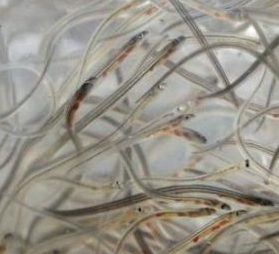
For Atlantic Canada, Fishing Season Brings Yet More Violence
In the early morning dark of April 12, 2023, violence erupted along a Nova Scotia riverbank after a man engaged a woman and a youth in a heated argument. Soon after, seven people arrived. One allegedly assaulted the man with a pipe while another stood nearby wielding a knife and a taser. When the RCMP later arrested two members of the group a short distance away, the officers found two shotguns and a taser. Conflict around elvers is not new, nor is it the only fishery in Atlantic Canada that’s seen so much turmoil. Whether it’s around elvers, lobsters, or something else, “this will continue to play out, and play out, and play out, until the government deals with the issues on the table.” >click to read< 08:05

Fisheries report brings hope to Indigenous communities, sparks anger in industry
“I was pleasantly surprised, to be honest,” said Rosalie Francis, a member of the Sipekne’katik First Nation in Nova Scotia. But elsewhere in the province, the surprise has been significantly less pleasant. There are concerns the report titled “Peace on the Water” is instead stoking anger in communities where lobster is a livelihood. Representatives of the commercial fishing industry say they’re frustrated they weren’t invited to speak to the Senate as it drafted the report on Indigenous rights. It’s “throwing fuel on a fire” in an area where tensions have remained high since 2020, said Colin Sproul, president of the Unified Fisheries Conservation Alliance, which has about 1,900 members. >click to read< 12:09
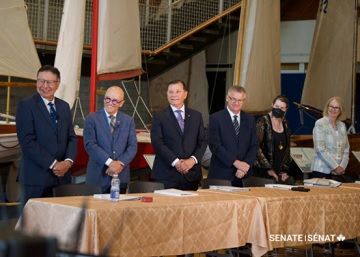
New Report Shows Canadian Government Has Failed Indigenous Fishers
The Standing Senate Committee on Fisheries and Oceans had harsh words for the Canadian federal government. At a meeting this week in Halifax, Nova Scotia, the committee presented its new report, which looked at the implementation of Indigenous rights-based fisheries. Its findings suggest that, despite more than two decades since key precedents were set, the fisheries have not been fully implemented. This has led, the committee stated, to confusion, tension and violence. In Canada’s Atlantic provinces (Nova Scotia, New Brunswick, Prince Edward Island and Newfoundland and Labrador), as well as parts of Quebec, 35 First Nations have a treaty right to fish for a moderate livelihood. >click to read< 14:50
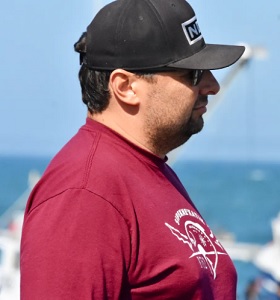
The Mi’kmaq fishing dispute: What the treaties said and how the wording could affect a future fishery
“We have a treaty right,” said Chief Mike Sack, wearing a hat emblazoned with Honour Treaties, when asked why the band had renamed their effort from the “moderate livelihood” fishery they launched last fall. The latter term was coined by the Supreme Court of Canada in its 1999 Marshall decision. But the decision that acknowledged a moderate livelihood treaty right also stated the authority to regulate, after consultation with First Nations, is held by the federal fisheries minister. With Sipekne’katik fishers setting traps under a self-regulated treaty fishery and federal officers hauling them and arresting Chief Sack for questioning on suspicion of inciting an illegal fishery, the question is raised: what do the treaties say? >click to read< 10:21

Nova Scotia’s Mi’kmaq chiefs want to see the science that restricts their fisheries.
Last week, Federal Fisheries Minister Bernadette Jordan, in a bid to end the conflict that has arisen since the Sipekne’katik First Nation began a moderate livelihood lobster fishery in September, announced that such fisheries would be required to operate within established commercial fishery seasons. That announcement, sandwiched between two meetings with the Assembly of Nova Scotia Mi’kmaw Chiefs, won praise from commercial fishers, who have contended that fishing outside their established seasons harms the fish stock. However, it drew scorn from Indigenous fishers,,, In a statement Friday, the assembly said that despite requesting specific data sets from the department during meetings over the past week, “including detailed scientific, economic and management data to justify the imposition of commercial seasons,” no such data has been provided. >click to read< 07:40
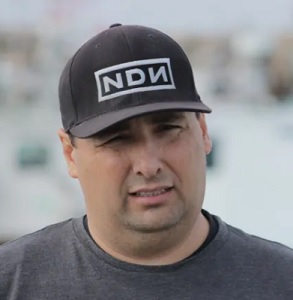
Feds say all fisheries must operate within the commercial season. Mike Sack says ‘not going to happen’
Fisheries Minister Bernadette Jordan said in a statement on Wednesday that Ottawa will not issue licenses to fisheries that operate outside the federal commercial season. Last fall, the Sipekne’katik First Nation in Nova Scotia launched its own self regulated, rights based lobster fishery outside the federal fishing season, sparking a violent backlash from commercial fishers. Sack says the federal government has no right to impose its rules and regulations on the Mi’kmaw, and that Sipekne’katik’s fishery will be back this year — bigger and better than ever. >click to read< 07:51

Fisheries Minister Jordan: A new path for First Nations to fish in pursuit of a moderate livelihood
We have never stopped working with First Nations to reach agreements and implement their right to a moderate livelihood. That is why effective this season, we will introduce a new path for First Nations to fish in pursuit of a moderate livelihood, one that addresses much of the feedback we’ve heard over the past year. This plan will support individuals, their families, and their communities. It’s a path that is flexible, adaptable, and based on three key principles: implementation of First Nations Treaty rights, conservation and sustainability of fish stocks, and transparent and stable management of the fishery. >click to read< 21:53
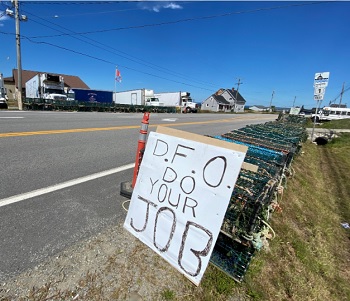
Quiet seafood truck protest: DFO urged to crack down on illegal out of season lobster fishing
The owner of a seafood company that has trucks parked at the DFO detachment declined an interview and wouldn’t comment about the protest or who organized it. Asked why the trucks are there the company owner simply said, “DFO knows.” The trucks were first parked at the DFO detachment on Aug. 27, the same day hundreds of commercial lobster fishermen protested outside of federal Fisheries Minister Bernadette Jordan’s office in Bridgewater demanding DFO provide enforcement. As they have in previous summers, fishermen have been raising concerns over what they say is out-of-season commercial lobster harvesting taking place. They say commercial activity is happening under the guise of the First Nations fishery and accuse some fishers of abusing the intent of that fishery. photos, >click to read< 20:38

Consultation lacking on decision to reactivate licenses for Indigenous communities
The reactivation of dormant lobster fishing licences by the federal government has prompted a terse statement from the P.E.I. Fishermen’s Association (PEIFA) and the Maritime Fishermen’s Union (MFU). The two organizations say they were left out of consultation over the reactivation of 10 lobster licences by the Department of Fisheries and Oceans (DFO) in the Lobster Fishing Area (LFA) 25, located on the western end of the Northumberland Strait between P.E.I. and New Brunswick.,,, The statement said fishermen were “frustrated” by the lack of consultation prior to the decision and called for the federal government to bring together Indigenous and non-Indigenous fishermen’s organizations. >click to read< 09:54
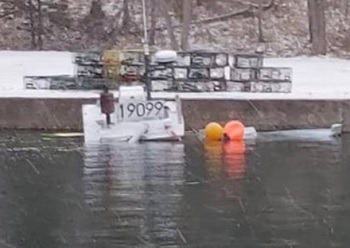
“There are a lot more boats coming and bigger boats,” Tensions rise after suspected sabotage of Eskasoni fishing boat
The RCMP are investigating the apparent act of sabotage at the St. Peter’s Canal and have copies of recordings from video cameras there. The Eskasoni fishermen were catching lobster under the banner of a moderate livelihood fishery. While the right was acknowledged by the Supreme Court of Canada in its 1999 Marshall Decision, Fisheries and Oceans Canada has yet to reach an agreement with the Assembly of Nova Scotia Mi’kmaq Chiefs on how to implement it. Meanwhile, tensions rise as First Nations fishermen on the Northumberland Strait, Cape Breton, Eastern Shore and South Shore have started to fish outside of the normal commercial seasons. >click to read< 07:44

































